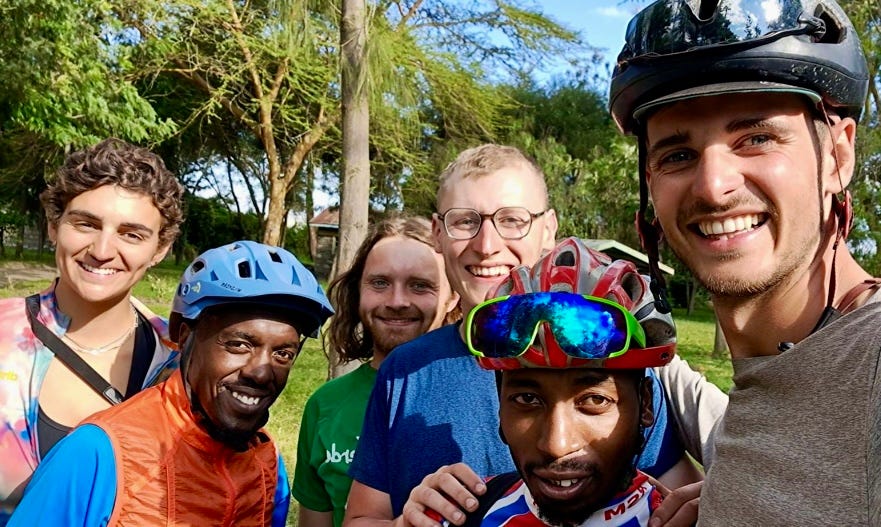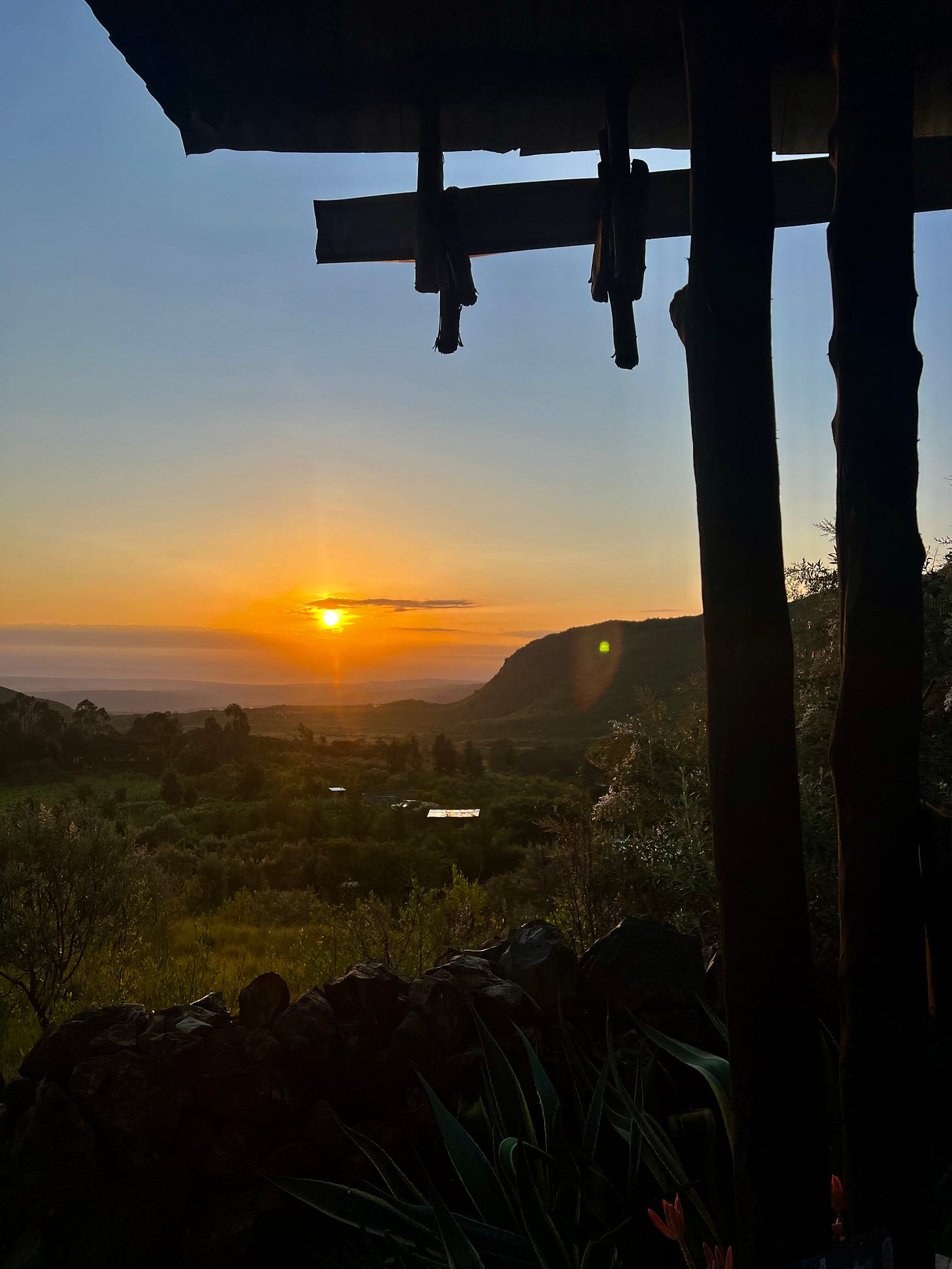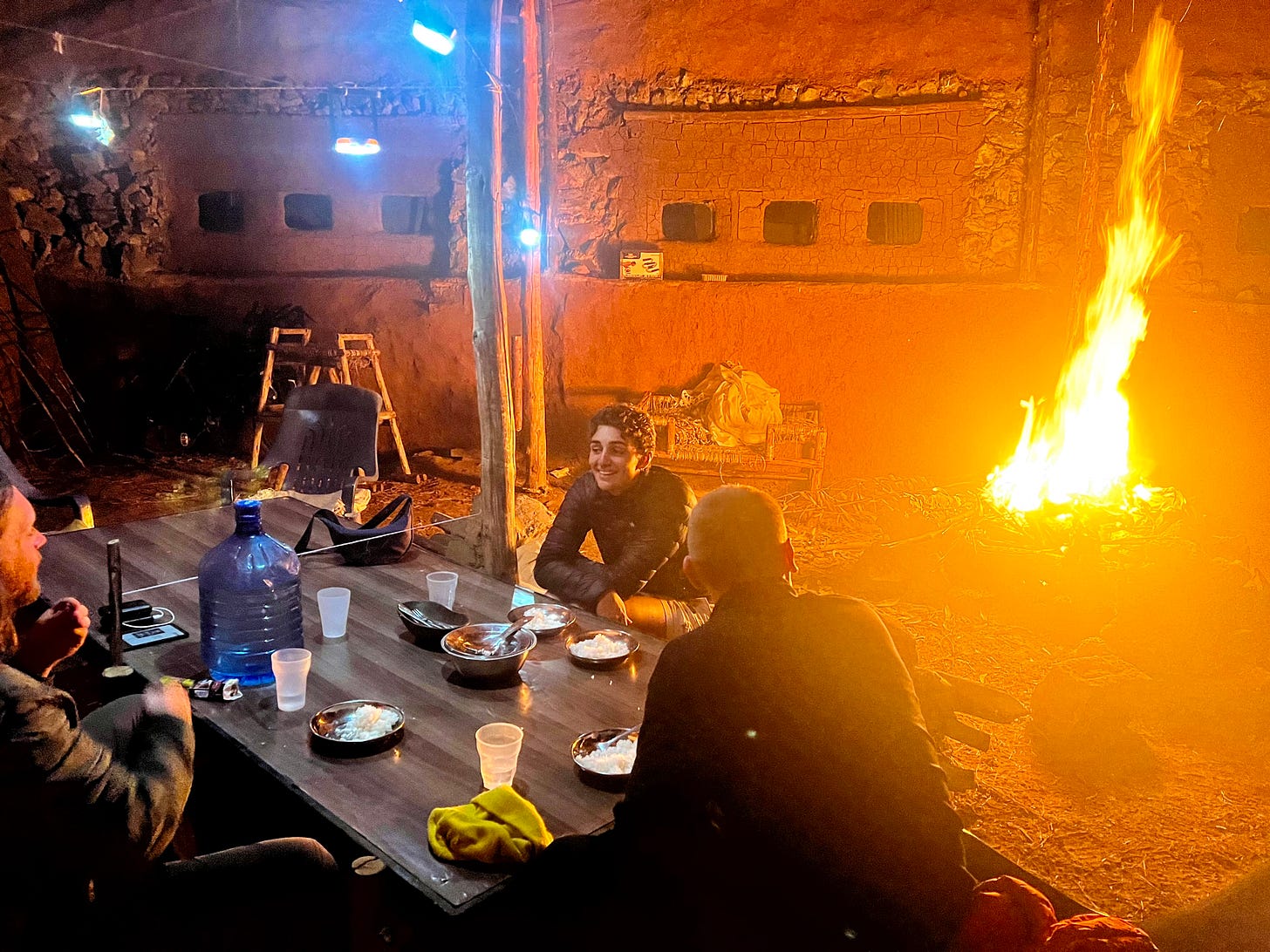Just north of Nairobi, we bumped into some Kenyan cyclists – Tom and Marvin – who’d just set off on their first bikepacking trip to celebrate Tom’s 40th birthday, which happened to be that day. All six of us then bumped into perhaps the single least cycle-friendly road in East Africa. It was pure chaos, and consisted of two deeply rutted lanes with a white line dividing them. This white line was at worst, totally invisible, and at best, a minor inconvenience to the Kenyan truckers who careered across it in moves of reckless impatience that often had us staring down the barrel of a head-on collision.
There was no hard shoulder, so we rode in formation, two deep, and gestured wildly in a weak attempt at traffic control. These safety measures were also just a minor inconvenience to the truckers who, in response, honked lazily and then casually ran us off the road. After some ten kilometres of this insanity, we then all – six cyclists, some six hundred trucks and a road – bumped into the edge of the Great Rift Valley, which sent the road sweeping down the steep escarpment at its edge, and the vehicles careering down after it. It had been frustrating enough being run off the road onto the coarse scrubland of its verges, so the thought of being run off the road straight onto the valley floor, some thousand metres below us, sounded like a downright hassle. To avoid this, we soon abandoned formation and resorted to tailing the trucks, hanging back just enough to avoid the cavernous potholes that appeared suddenly behind them, but not so much as to encourage one of their friends to try and squeeze into the gap we’d just created.
We congregated at the bottom – a jangling tangle of nerves – and talked politics with our Kenyan friends in an attempt to calm ourselves down. This failed. Kenyan politics, that week, was not a calming subject. There’d been a finance bill proposed by the government that was unpopular to say the least. It proposed a regressive tax rise on many of life’s essentials, from cooking oil to internet data, that was felt to be in utter contradiction to the government's pledge to shift the burden away from the poorest Kenyans. Unrest was brewing, and there were demonstrations beginning to take place, organised by the country’s younger generation on social media. At this point, these demonstrations were peaceful.
Once we’d escaped the dreaded truck road, we diverted off the main highway between Nairobi and Nakuru with an aim to cycle a loop of Lake Naivasha. Kenyan Tom had a campsite in mind – a beautiful looking lodge that cascaded down to the lake’s shoreline, a suitably celebratory stage for a 40th birthday – but we, being utter cheapskates, opted for the YMCA. Our new friends hid their bemusement rather well – after all, much of the development around Lake Naivasha had been built to serve Western tourists just like ourselves – and agreed to come with us to scope out the budget option before deciding.
We arrived at a very passable campsite – in that it was turfed and flat – and agreed a surprisingly modest rate for the night. Tom and Marvin chose to continue to plusher pastures and we exchanged numbers in case our paths might cross again in the future. Once they’d left, the buoyant campsite manager came over and warned us that we may have some visitors during the night. Hippos, she explained, track the same grazing pattern every evening. At 7:30pm, they emerge from the lake’s shore and tramp their way slowly up their chosen path to graze on the very turf we were preparing to camp on. We shouldn’t worry, she continued, interactions were only fatal if the hippos were startled. If we made sure to carry a torch, it was unlikely we’d accidentally bump into one. The surprisingly moderate rate was beginning to make more sense.
The appeal of the more luscious patches of grass quickly faded, and we soon found ourselves scrambling to find the most pallid sections of lawn on which to pitch our fragile tents. Seamus, who’d been valiantly battling a nasty case of the Higley Effect all day, had opted for a bed in one of the huts on offer. These lay, rather inconveniently, on the other side of the hippo tracks. Over dinner at a nearby roadside shack, the local chef – having learnt where we were camping – reassured us that we’d be ok as long as there wasn’t a new male challenging the incumbent over its territory. And, when we got back, the campsite’s security guard cheerfully informed us that we were in for a treat tonight: there was currently a new male challenging the incumbent over its territory. Apparently clashes could be quite the spectacle.
Now you might be thinking that one member of our group was finding all this information rather unsettling. And you’d be right. Though you might be wrong about who. While Tom, Nadia and I sat serenely under the pergola of a covered picnic table – watching, mesmerised, as bush babies flung themselves through the canopy overhead – Seamus fiddled anxiously with his cigarette before stubbing it out and rising to leave. It was 7:29pm and he was not planning on being caught on the wrong side of Hippo Highway. Despite much teasing from Tom – who was only too happy to relinquish the role of wildlife worrier – Seamus strode resolutely back to the safety of his hut and refused to emerge again, having judged that his doorway was narrow enough to protect him from any unwanted intruders.
As it happened, Seamus had rather jumped the gun. It was closer to 8:30pm by the time we saw the outline of the first waddling form through the tree line. But, in all fairness, the plump shadow did seem to be headed straight for Seamus’ cabin. Perhaps the early night was a sensible call. As it got closer, the sharp white beam of his phone torch – which had, until now, been protruding from the open door – shot inside and moved instead to the adjacent window. Us trio of campers strained through the dark for a little while longer, before retiring to our tents. The nervous excitement that had bubbled up at the first sight of our near-two-tonne roommates drained with the last of the light, and we slept deep and untrampled through until morning.
As it happened, the only one of us who was disturbed in the night was Seamus, who it appeared had been burgled. Clearly his barricaded door wasn’t the only means of entrance. I’ve only since discovered that the collective noun for bush babies is a plot, which seems fitting given how effectively they conspired to steal our breakfast through a barred window.
We rose early for our long-awaited date with a national park. Hell’s Gate is one of Kenya’s only national parks to allow unaccompanied cycling – a fact which put it well and truly in our good books. I’m sure you’ve all seen enough Attenborough to know what such places are all about, so I’ll save you a frilly description and instead simply confirm that the animals we saw were staggering. Apart from one herd of water buffalo who looked, for a moment, as if they were charging. Naturally, I was just as fascinated by the rock formations as the wildlife. Several proud walls of well-featured gneiss flanked the gravel track that snaked through the park. Some local guides were casually roping up for a morning climb as we passed, and a large part of me wanted to join them rather than riding around trying to spot animals. That was, of course, until I spotted the animals which, as I’ve said, were staggering.
We had lunch in another roadside shack and enjoyed a Kenyan classic of ugali, beans and greens. I took some time replying to various messages that I’d neglected through the night, in case the ping of a response had startled one of our tramply neighbours. Just as I was drafting a message to Tom and Marvin that included some well-meaning, but ultimately airy notions that the universe might at some point reconnect us through our shared love of cycling, they walked through the door. The question of how in the world they’d found us stumped me for a moment, until I realised that the gravel track we were on was simply a continuation of the main road around Naivasha, and that our quartet of mzungu cyclists wasn’t exactly inconspicuous. We cycled on together, spotting almost more wildlife than we’d paid for the pleasure of seeing within the park’s boundaries, including another towering giraffe – a sight which, if you can believe it, had become rather run-of-the-mill that day. After an afternoon of testing gravel – that concluded with a gruelling and technical ascent of something that more closely resembled one of Hell’s Gate’s gneiss cliffs, than anything up which you could hope to navigate a vehicle – we parted ways once more with Tom and Marvin and headed for Earth Camp.
Earth Camp is a remote collection of lodgings, built and run by Kaz, an eccentric Japanese expat. There we spent three days in a state of total relaxation, allowing the strain of a nine day riding block to seep slowly from our muscles. This process was expedited by stints spent in Kaz’ makeshift saunas – ramshackle constructions of timber and polythene that smothered the steaming vents of volcanic boreholes. The food there was mouthwatering, partly due to the explosive concoction of Asian flavours, and partly due to the fact that the portion sizes did little to satisfy our insatiable hunger. It didn’t take Kaz long to clock onto our impressive appetites and soon he began to produce a vat of plain white rice to line our stomachs before each meal. It was heaven. But, from our lofty celestial heights, things began to go wrong.
We were using Earth Camp as a stop gap while we waited for the arrival of an international delivery of spare parts. As a result of the cycling shoe debacle, I’ve spent the last 1500 kilometres riding in Crocs. As big a Croc fan as I might be, I can’t bring myself to endorse their effectiveness on the bike. Cycling shoes are often designed for their stiffness, a quality that allows an efficient transfer of power from the feet to the pedals. Crocs, as I’m sure you’re aware, are about as stiff as a pair of slinkies. The feeling you get while riding in them, especially while climbing, is eerily akin to riding with flat tyres, so much so that on several occasions I’ve leapt off the bike to give them an investigative squeeze. I’d arranged to ship out some replacement footwear, along with a handful of other necessary spares, as quickly as possible, and at considerable expense. We were perched at Earth Camp waiting to pounce on this parcel as soon as it arrived in Nakuru, the next major town, which it had promised us it would do very soon.
However, on our second morning, I woke to a rather unsavoury breakfast – an import tax bill of astronomical proportions – which, after some fruitless huffing and puffing, I swallowed. During our lessons on Kenyan politics with Tom and Marvin, we’d learnt that the government is rather keen on their import taxes. Cars, for example, carry a duty of 100%, meaning that Kenyans have to cough up just as much as they’ve spent on the thing for the privilege of getting it into the country. I suddenly felt my support for the current tax-related protests intensify. Still, we needed the parts, and if these taxes would smooth the runway for the package to reach us as planned, then so be it. In fact, the taxes may have quite literally smoothed one of the country’s runways, given its leaders’ proclivity for air travel, a habit for which they’ve inherited the moniker of the air hostess government.
Having stayed a night longer at Earth Camp, to allow our package to make the journey from the capital, we left early the next morning, optimistic about intercepting it later that day. Unfortunately, our friends at customs had other ideas. Apparently, despite having been cleared, the parcel still had to be processed. This was a very bureaucratic sounding task which, I was told, would take four working days. This news put me in a very sour mood indeed. After assessing my options – among which were a 48 hour bus round trip, a week of solo riding, and yet more import duties to send the thing to Uganda – I gave up trying to figure it out and resorted to eating an entire tube of Oreos to numb my frustration. Realising that no amount of pleading would burn the red tape that decorates Kenya’s imports office, we decided to kick the logistical can down the road and ride on. That’s when things began to go wrong-er.
Having used up the last of our cash extending our stay at Earth Camp, we needed to stop by a bank in Nakuru. The only problem? Nakuru was currently at the epicentre of the country’s protests which were, by now, less peaceful. We rode apprehensively into the city’s outskirts. A faint mist hung above the sprawl of buildings ahead of us. The road was eerily quiet. I gradually began to notice that the soundtrack of greetings that usually serenades our progress had fallen silent. Something so constant is often only noticed in its absence.
Up ahead, the blare of car horns shattered the brittle hush. A commotion on the main road forced us onto a smaller side road. There we found the highway’s missing traffic. Masked men wove through the gridlock on mopeds, the stench of hard liquor swirling in their slipstream. They passed inches from us, turning just long enough to fix us with bitter stares – devoid of all curiosity, all compassion. They were stares which said, very clearly, go home white man. And when it wasn’t said with their eyes, it was hissed from beneath their masks.
We left the town shaken. At one point, having diverted towards the city centre in search of the cluster of banks, we’d found ourselves back on the highway, flanked by protestors. For a split second, all eyes had been on us. The hostility had been palpable – a tinderbox of tension that we’d ridden through like a naked flame.
That evening, having depleted our batteries as well as our currency at the off-grid Earth Camp, we chose to stay in a hotel and hatched a plan to make liberal use of their electricity for the night. The slippery reception staff of the aptly named Eel Hotel assured us this was possible and then promptly switched off the generator. We woke with our power packs flat and our energies in a similar way. The events of the day before, which had left three people dead in Nakuru alone, had echoed through the grand hallways of the hotel all night – a symphony of 10-second snippets broadcast across the country’s web of social media. That day, we’d lost Kenya. And try as we might, there was nothing we could do to get it back.










Wow, how different a country can present itself from 2 wheels
Glad to hear you had no close encounters with hippos ..... they are BIG
Hope cycling shoes will fit when they arrive
Keep on keeping on Rosie xxxx
Sobering piece, Maestro! So different from the Kenya we loved earlier this year. Hope you’ve got some cycling shoes by now 🙏